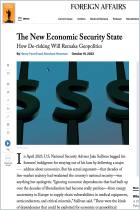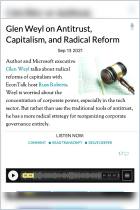加入 getAbstract 阅读摘要

加入 getAbstract 阅读摘要
Barry C. Lynn
Antimonopoly Power
The Global Fight Against Corporate Concentration
Foreign Affairs, 2021
看看什么内容?
Concentrations of global economic and political power threaten US security.
Recommendation
Apple, Microsoft, Google and Amazon dominate information dissemination, leverage data collection and wield enormous political influence. The power these firms exercise rivals that of Standard Oil and Carnegie Steel more than a century ago, says policy expert Barry C. Lynn. But corporate monopolies are just one piece of a broader global narrative, he writes: Political and economic power is becoming highly concentrated among a relatively small number of nations, businesses and alliances. Lynn offers a thoughtful examination of monopoly behavior – and what it takes to mitigate it – in this compelling report.
Summary
About the Author
Barry C. Lynn is the executive director of the Open Markets Institute and the author of Liberty From All Masters: The New American Autocracy vs. the Will of the People.

















Comment on this summary